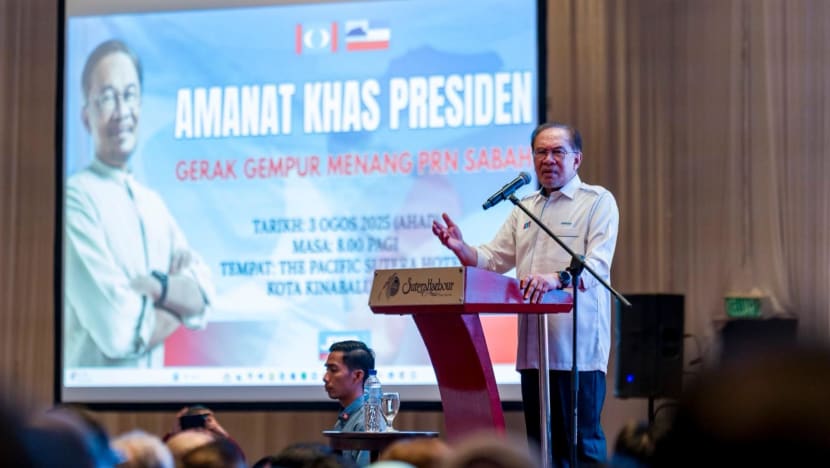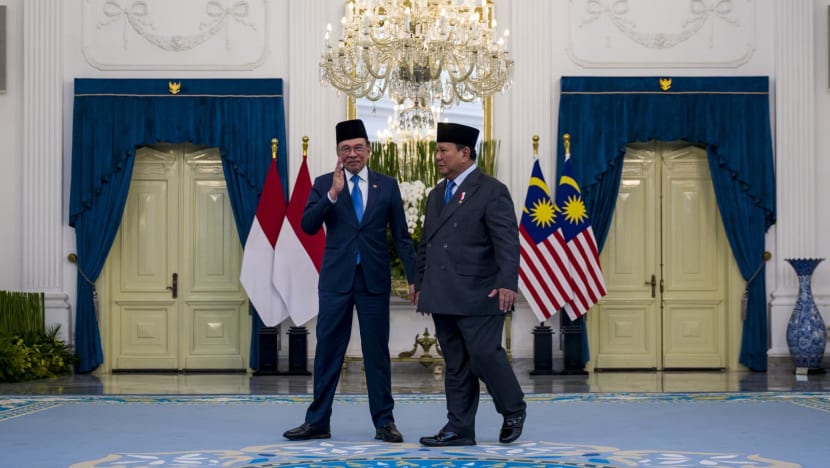Malaysia will ‘protect every inch of Sabah’ in maritime dispute with Indonesia, says PM Anwar
Malaysia and Indonesia have overlapping claims over an oil-rich area in the Sulawesi Sea off the east coast of Sabah, with joint development a potential solution.

Malaysia Prime Minister Anwar Ibrahim speaking at a state election event in Kota Kinabalu, Sabah on Aug 3, 2025. (Photo: Facebook/Anwar Ibrahim)

This audio is generated by an AI tool.
KUALA LUMPUR: Malaysia will defend Sabah’s rights and sovereignty in its discussions with Indonesia over a disputed oil-rich area in the Sulawesi Sea, Malaysia Prime Minister Anwar Ibrahim said during a visit to Kota Kinabalu.
“We will negotiate it properly, without surrendering. This was all in the meeting, not just under-the-table talk,” he said as quoted by the Malay Mail on Sunday (Aug 3), referring to discussions during the 13th annual consultation between both countries that was held on Jul 29.
“We will protect every inch of Sabah. I will defend this principle. I chose to answer this now because we are defending Sabah on behalf of the federal government,” Anwar added.
Malaysia and Indonesia have overlapping claims over sea blocks ND6 and ND7, which Putrajaya calls the Sulawesi Sea and Jakarta calls Ambalat.
When Anwar and Indonesian President Prabowo Subianto met in Jakarta on Jun 27 to prepare for the annual consultation, they agreed to jointly develop the area.
Hopes were raised that the two countries would be able to find a way forward to resolve the long-standing bilateral issues, with more details of the joint development potentially emerging from the leaders’ meeting a month later.
However, when members of parliament from Sabah, the Malaysian state closest to the disputed area, questioned Anwar in parliament on Jul 22, the prime minister stressed that no final agreement had been reached, as discussions were still ongoing.
Still, analysts told CNA that the prospect of a Malaysia-Indonesia joint development remains on the table pending further negotiations, despite Sabah’s questions and how this option was not mentioned in the annual consultation joint statement that was released on Jul 29.
In the statement, the leaders welcomed “continued progress” in the negotiations on maritime boundary delimitation, and reiterated the importance of the relevant agencies “maintaining constructive engagement and close coordination”.
Speaking after the leaders met, Indonesia Foreign Minister Sugiono said the two countries are still at the stage of explanatory talks on Ambalat.
"Technically, it's still a long way to go," he said, adding that technicalities will be discussed by the relevant ministries.

Analyst Adib Zalkapli of the geopolitical consultancy Viewfinder Global Affairs said the two countries could have chosen not to mention developing Ambalat together in the joint statement due to ongoing discussions.
“One possibility is because both sides are still negotiating the technical aspects of the agreement that any public statement by the leaders would be counterproductive,” he told CNA.
“In negotiating border issues or joint development in disputed areas, the biggest challenges are the technical details and the commercial arrangements, not so much domestic politics.”
Anwar said on Sunday that Malaysia's discussions with Indonesia on the Ambalat dispute are a sign of good friendship.
“This is a border issue between two countries, and Indonesia is an ally. President Prabowo is my personal friend, a family friend. I want it to be a good relationship,” he said.
“We talked about Sulawesi, and I wanted Hajiji to hear for himself, and give his view. We will discuss perimeters, following maritime laws, following history. It must be approved by the state government and subsequently the state legislative assembly.”
SABAH’S INVOLVEMENT
Anwar was referring to Sabah Chief Minister Hajiji Noor, who also attended the annual consultation in Indonesia alongside other Sabah government agencies.
However, Hajiji said on Jul 30 that the Ambalat issue was not discussed in detail during the visit, as reported by Malaysiakini.
“We have already stated the state government’s stance and that meeting’s discussion was very positive,” he told reporters.
“So, the related matters are still being refined, and it’s very good for the state of Sabah. That’s all I can say for now.”
Malaysia’s Deputy Foreign Minister Mohamad Alamin told parliament on the same day that the Ambalat dispute was raised at the consultation in general terms, and that the federal government took Sabah’s interests in the matter seriously.
“In this matter, the federal government constantly conducts detailed and comprehensive assessments on any resolution, including economic cooperation, in finding a decision that mutually benefits both sides,” he said.
Geostrategist Azmi Hassan from the Nusantara Academy for Strategic Research told CNA the countries are maintaining “status quo” on Ambalat as they thrash out a deal.
“Similar to the South China Sea (maritime dispute between Malaysia and China), status quo is the key word here. And during the status quo, technical negotiations can continue,” he said.
“If it cannot be resolved in terms of boundary delineation, then at least, I think a joint venture will be accorded between Petronas and Pertamina in this case,” Azmi added, referring to the national oil companies of Malaysia and Indonesia.
“Because we know there is a huge abundance of oil reserves there, and not doing anything there will be a negative economic impact for Malaysia and Indonesia.”
The Sulawesi Sea dispute has been difficult to resolve as it involves overlapping claims of both maritime boundaries and the sovereignty of two island features, Pulau Sipadan and Pulau Ligitan.
In 2002, the International Court of Justice awarded the two islands to Malaysia, but did not settle the overlapping maritime boundaries. The area has experienced periodic flashpoints over the years as the two countries have attempted to resolve the dispute.
In 2004, Petronas awarded a concession to Shell to explore the area, sparking protests from Indonesia, which had granted similar rights to Italian energy company Eni, according to Malaysian news outlet The Star.
In 2009, Indonesia protested Malaysia’s military presence in the area, and the following year, Indonesian navy vessels purportedly came close to opening fire on a Malaysian navy patrol ship for ignoring orders to leave.
While Azmi noted that the dispute has been “dragging” on for a long time with past leaders unable to resolve it, he believes Anwar’s “very close relationship” with Prabowo will “make things easier”.
“When Anwar mentioned that there will be a joint development (of Ambalat) with Indonesia, I think it was not finalised. I think on the part of Malaysia, maybe it was premature or just to test the scenario first,” he said.
Adib from Viewfinder Global Affairs acknowledged that when top leaders meet, the general expectation is that major issues have been resolved or their countries have reached a concrete agreement on such issues.
“However, it is not uncommon for such meetings to take place even with unresolved matters still in the background. If this was the case, then the recent meeting should help in getting Indonesia and Malaysia to the finishing line,” he added.
“When the financial gains for both countries are clear, negotiations are likely to conclude quickly.”

















